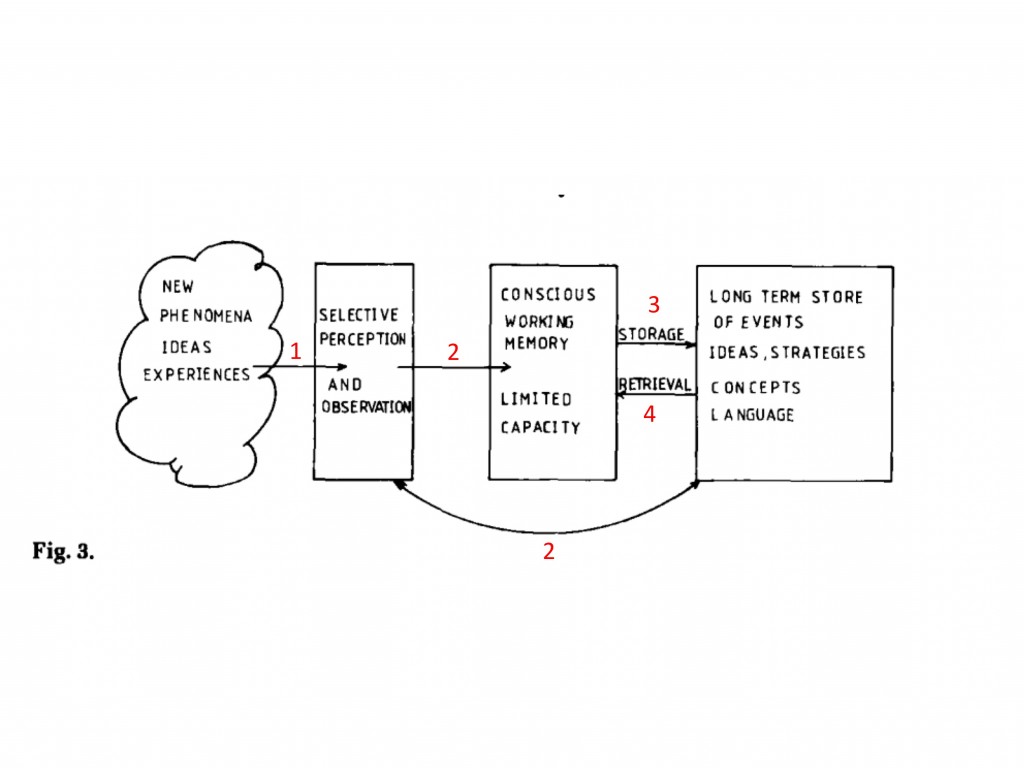Cognitive science and science teaching
I think we would all agree, science teaching is hard, but why?! What exactly is it that makes science so difficult to teach? One of the significant challenges of science teaching, as opposed to other subjects, is that we are trying not just to get students to learn new knowledge, we are also asking them to unlearn many of their existing ideas. For the most part, science teachers are having to tackle these two problems simultaneously – demolition and construction! On top of this, many of the new ideas we are teaching are abstract, cannot be seen and do not relate to pre-existing ideas. The graphic below comes form a fascinating paper by A.H. Johnstone entitled “Why is science difficult to learn? Things are seldom what they seem” and provides a useful framework for us to explore the challenges of learning science in a bit more detail. And remember, learning is a change in long-term memory.
 Why is learning science hard?
Why is learning science hard?
- Many scientific concepts cannot be easily experienced as there are no immediate sensory ways to get at the idea. I know what a cat is because I have seen and stroked a cat. But how do you experience natural selection or translation?
- Students will perceive and observe in a selective way based upon previous knowledge and expectations stored in their long term memory e.g. heavy things sink, light things float. Science is counter intuitive and this makes it hard to learn.
- Storage. For many topics nothing can be pulled out from long term memory to match or anchor new ideas to. Students do not have developed schemas to make sense of new science knowledge and so ‘filing’ these new ideas away in long term memory is difficult.
- Retrieval. Much of what is retrieved from the long term memory is in fact wrong (misconceptions), or at least not scientifically acceptable, and so provides the working memory with incompatible information to what is being observed. Ouch!
With all of the above, confusion can reign and working memory space can become overwhelmed. This is especially true if teachers jump from observation, to explanation to representation. So how can cognitive science help us?
Some key cognitive principles taken from the Deans for Impact report
- Students learn new ideas by relating them to what they already know
- have clearly established progression maps for key concepts in science education so that you can sequence the curriculum
- check prior knowledge and build from there
- start from the concrete and move to the abstract – analogy models will help
- Information is withdrawn in a similar way to how it went in
- teach for meaning – stories and simple contexts can help here
- ask students to explain how or why something happened
- Students transfer new information from working memory to long-term memory. Working memory is limited and can be overwhelmed by information that is too challenging
- don’t challenge too much when first teaching concepts
- use direct instruction to teach initial ideas
- make sure practical work is focused on developing key aspects – be mindful of procedural and conceptual demands
- Learning does not happen in an age-related way – it happens in fits and starts
- have a clear progression map for how concepts should be learnt – learning requires elaboration
- don’t avoid teaching concepts because they are ‘biologically inappropriate’ e.g. an eight year old can understand atomic structure if they have the necessary prerequisite knowledge
- Deliberate practice is essential for learning new knowledge
- the act of retrieval on regular low-stakes quizzes that are spaced out over time can help students remember
- alternate what topics you are teaching to help memory
- Each subject has a set of facts that aid problem solving and free-up working memory
- important topics I think to get right: chemical formula, particle model, energy, evolution
- Learning requires motivation
- Feedback is important in acquiring new skills
Further reading
- Lee, H. S., & Anderson, J. R. (2013). Student learning: What has instruction got to do with it?. Annual review of psychology, 64, 445-469.
- Johnstone, A.H., (1991). Why is science difficult to learn? Things are seldom what they seem. Journal of computer assisted learning, 7(2), pp.75-83.
- Deans for Impact (2015). The Science of Learning. Austin, TX: Deans for Impact.
- Sweller, J., Ayres, P., & Kalyuga, S. (2011). Cognitive load theory. Springer, New York, NY.
